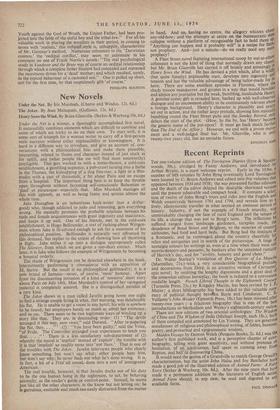New Novels
Henry Sows the Wind. By Brian Glanville. (Seeker & Warburg. 10s. 6d.) Under the Net is a winner, a ttioroughly accomplished first novel. It successfully combines elements which are difficult to combine and some of which are tricky to do on their own. To start with, it is some sort of triumph for a woman writer to carry off a first-person male narrator without either implausibility or knowingness. It is hard in a different way to introduce, and give an account of, con- versations with a philosophical bias and make them plausible, Interesting, related to theme and character instead of just stuck in for uplift, and (what people like me will find most noteworthy) intelligible. This gets worked in with a mime-theatre, a cold-cure establishment, a gambling sequence, a pub-crawl turning into a bathe In the Thames, the kidnapping of a dog film-star, a fight in a film- Studio with a cast of thousands, a bit about Paris and an escape from a hospital. The important thing here is to keep the throttle open throughout without becoming self-consciously Bohemian or d' or picaresque—especially that. Miss Murdoch manages all this with aplomb, as well as being funny and serious almost the whole time.
lake Donaghue is an industrious hack-writer (not a drifter: good) who, though addicted to judo and reasoning, gets everything wrong. He mentally permutes the probable relations between his inale and female acquaintances with great ingenuity and inaccuracy, and keeps it up well. One of his friends, met in the cold-cure establishment, is Hugo Be!founder, a sort of rushing-about Wittgen- stein whom Jake is ill-advised enough to ask for a statement of his philosophical position. Be'founder is naturally very affronted by this demand, 'but replies to the extent of showing how all theorising is flight. Jake writes it up into a dialogue appropriately called The Silencer, from which we are given a too-short extract. Much later, it is Jake who follows the example of Wittgenstein by becoming a hospital orderly.
The shade of Wittgenstein can be detected elsewhere in the book, intermittently performing a contradanza with an apparition of M. Sartre. But the result is no philosophical gallimaufry; it is a neW brand of humour—never, of course, 'mere' humour. Apart from the disconcerting intrusion of a kind of 'sensitive' short story about Paris on July 14th, Miss Murdoch's control of her variegated material is completely assured. She is a distinguished novelist of a rare kind.
The Joker shows us a man called Javelin going home one night to find a strange couple living in what, that morning, was indubitably his flat. He is unable to get a room in any hotel; his wife is nowhere to be found; her employers barely so much as admit her existence; and so on. There seem to be two legitimate ways of winding up a story like that. They are, in descending order: (1) "The devils arranged it this way, mon vieux," said Durand. "After re-papering the flat, they. . . ." ' (2) ' "You have been guilty," said the Voice, "pf Pride. The Controller arranged your experiences to teach you that. . . ." ' There is a less satisfactory sub-department of (2) whereby the moral is 'implicit' instead of 'explicit'; the trouble with is that 'implicit' so readily turns into 'not there.' That is one of the troubles with The Joker. Javelin interviews people who clearly I,Mow something, but won't say what; other people hate him, but won't say why; he never finds out what he's done wrong. It is, In fact, a bit of a Trial all round, done into a sort of immigrants' American.
The real trouble, however, is that Javelin ducks out of his duty to be the one human being in the nightmare, to act, by behaving normally, as the reader's guide or control-point. Instead, he seems just like all the other characters, in the know but not letting on; he Is garrulous, excitable and much too easily distracted from the matter in hand. And so, having no centre, the allegory whizzes about any-old-how; and the attempts at satire on. the bureaucratic state collapse without a platform of recognisable fact to hold them "Anything can happen and it probably will" is a recipe for farce, not prophecy. And—just a minute—do we really need any niorc prophecy? A Fleet Street novel featuring international scoop by out-at-elbow columnist is not the kind of thing that normally draws any cheers, but Mr. Brian Glanville has carried it off briskly and amusinglY I Henry Sows the Wind. He has devised a plot which, after a wadi)! (but quite funnily) implausible start, develops into ingenuity and tension and has the valuable advantage of being tailor-made for M hero. There are some excellent episodes in Florence, where the shady tycoon manceuvres and gyrates in a way that would bewilikr and silence any journalist but the weak, bumbling, incalculable HenrY• A genuine comic gift is revealed here, backed up with well-observed dialogue and an uncommon ability to be continuously relevant about a foreign background. Henry's character is plausibly and neatlY set out in action, and the rather largo prelude, showing him staticallY bumbling round the Fleet Street pubs and the Sunday Record, onlY delays the start of the plot. • (How, by the by, has 'Henry' become the generic name of the put-upon? It must go back much farther than The End of the Affair.) However, we end with a presto move' meat and a well-judged final bar. Mr. Glanville, who is ontj twenty-two years old, has an enviable future. KINGSLEY MO


































 Previous page
Previous page